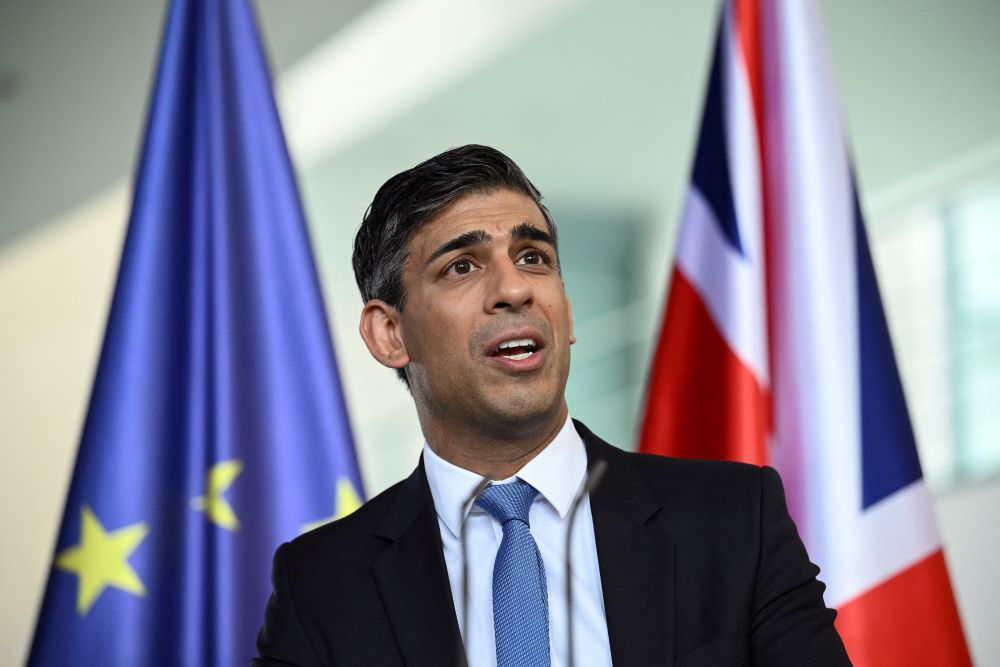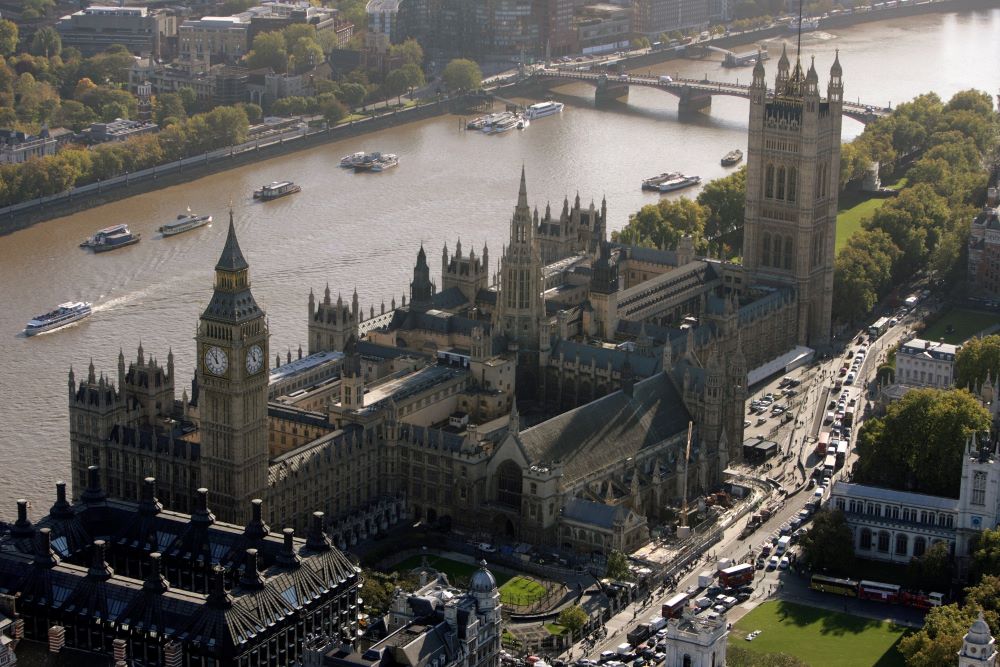
Three British opinion polls released June 15 point to a defeat for Prime Minister Rishi Sunak's Conservative Party in July 4's election. Sunak, shown speaking at a news conference at the Chancellery in Berlin April 24, took office on Oct. 25, 2022. (OSV News/Reuters/Annegret Hilse)
When premier Rishi Sunak announced parliamentary elections in May, some predicted his governing Conservative Party would be routed after 14 turbulent years in power.
With the vote set for July 4, its defeat at the hands of Keir Starmer's center-left Labour Party now looks certain, as Britain's Catholic Church joins others in offering guidance to voters.
"There are limits to what we can say and do during election campaigns," said James Abbot, communications director for the London-based bishops' conference of England and Wales. "But there are important issues we'd like candidates to look at, and we're urging Catholics to stay informed and ask questions of those aspiring to lead."
Sunak took office on Oct. 25, 2022, as Britain's first non-white prime minister and the youngest for two centuries, following the scandal-ridden premiership of Boris Johnson and the brief, economically disastrous tenure of Liz Truss. The former investment banker, a practicing Hindu who took his oath on the Bhagavad Gita, adopted a technocratic approach — achieving a degree of stability after prolonged crises over Brexit and the pandemic.
But with cost of living and energy supply problems still acute, many observers highlight a sense of drift in national life, as powerful but ossified state structures come up against strikes, rising crimes rates, pollution abuses and miscarriages of justice. "There's no doubt we're a deeply fractured society, with people living in their own bubbles and dismissing those around them," Fr. Jan Nowotnik, the bishops' mission director, told NCR. "I hope a new government, whatever its political color, brings about some much-needed reflection. But with all the parties just arguing at each other, without considering the real issues confronting people, I'm doubtful this will happen."
'Catholics should be showing there's another way — we don't have to be endlessly shouting at each other.'
—Bishop Brian McGee
In January 2023, Sunak set out his government's five priorities for "delivering peace of mind" within a year: growing the economy, halving inflation, reducing the national debt, cutting hospital waiting lists and halting illegal immigration. While claiming some success with the first two, he's underperformed on the other three, fueling disillusionment and badly eroding his poll ratings.
But his Conservative Party has also alienated certain Catholics with a hands-off approach to issues including abortion and gender ideology, and by failing to loosen the grip of what some see as an intolerant "woke" culture in the media and public institutions. Sunak's government has eased up on some liberal causes, but Catholics have also advocated for social justice issues like aid to the poor.
In May, the government also pledged to lift restrictions on admissions to religious schools, including the 2,100 owned by the Catholic Church, and instructed state schools to stop teaching the "contested theory of gender identity" to children.
Whether such gestures will reassure the church remains to be seen.

The United Kingdom's general election is July 4. Voters in each of the country’s 650 constituencies will choose a candidate to represent them as a member of Parliament. The Houses of Parliament in London are shown July 11, 2019. (OSV News/Reuters/Kieran Doherty)
In April, the Catholic bishops published a pastoral reflection, criticizing current theories related to gender identity, and calling on church schools and parishes to uphold traditional Biblical teachings on human identity and sexuality. During the same month, doctors in the National Health Service stopped prescribing puberty-blocking hormones to young people with gender dysphoria, citing safety concerns, while an independent review accused child gender services of being steered by ideology rather than "pediatrics and mental health."
Similar controversies have flared north of the border in Scotland, where a new Hate Crime and Public Order Act, in force since April 1, which criminalizes "threatening or abusive behaviour" toward transgender people. Scotland's Catholic bishops expressed deep reservations about the act, sponsored by the ruling Scottish National Party, warning its ban on undefined "inflammatory material" could outlaw passages from the Bible and the Catechism of the Catholic Church. And they've condemned legislation to outlaw prayers outside abortion clinics, warning it will have a "chilling effect" on freedom of speech and assembly.
In a pastoral letter in April, the bishops also urged Catholics to reject "dangerous" proposals to permit "assisted dying." Here too, there've been signs of backtracking by the SNP government, now headed by John Swinney, who replaced the liberal Humza Yousaf as Scotland's first minister in May. Among his earliest moves, Swinney named the Protestant Kate Forbes as his deputy, a year after she was forced to withdraw from a leadership bid because of her opposition to abortion and same-sex marriage.
Bishop Brian McGee, whose Diocese of Argyll and the Isles sits on the stormy west coast, says uncertainty over which decisions can be taken by Scotland's own national government and which are reserved for London, has caused additional anxieties. But he agrees the reappointment of Forbes, a person of "deep Christian conviction," was politically significant.
"Though perceptions will differ, it seems the governments in Edinburgh and London are rowing back on some progressive causes, thinking there's a potential for votes if they do," McGee, who represents the Scottish church on the Rome Synod, told NCR.
While Scotland's Catholic bishops are preparing a pastoral letter for the elections, their colleagues in England and Wales have posted website material on how voters can best help the "poor, marginalized and vulnerable."
Cardinal Vincent Nichols of Westminster is president of the bishops' conference of England and Wales. (CNS/Paul Haring)
"Gospel values inform how we look at the world as Christians - they can also offer a different way of looking at politics, a way that puts the common good before self-interest," the website notes. "This is not just about leaders, it's about us. We are not merely the passive recipients of politics but active citizens, and an election is the best time for us to speak out as Christians, get involved and lead."
Among seven priority areas of Catholic concern, the bishops list criminal justice and life issues, as well as education, environmental issues, migration and asylum, peacebuilding and disarmament, together with "structural challenges and injustices" in taxation and family life.
In an accompanying video message, Cardinal Vincent Nichols, the bishops' conference president, said the Catholic Church's message could be summed up simply: how "to construct a society in which families can flourish."
Some British Catholics wish the bishops would go a lot further.
Abortion opponents participate in London's annual March for Life Sept. 2, 2023. Opposition to abortion and aid in dying and support for the "poor, marginalized and vulnerable" are among issues Catholic leaders cite as priorities for voters to consider in the July 4 U.K. elections. (OSV News/Courtesy ADF UK)
Religious beliefs and practices often appear in terminal decline in the U.K., with only small minorities attending Christian churches. A 2021 census suggested the number of Christians had fallen for the first time below half the population, currently 68 million, with a substantial 37% of citizens now claiming to have "no religion."
Against this background, Josephine Siedlecka, editor of London's Independent Catholic News agency, said she regrets the bishops have said little if anything on recent scandals and key foreign policy issues, and rarely even speak out on issues of key importance to the church, including abortion. "Compared to the risks facing outspoken bishops elsewhere, they're quite safe here, and I wish they would do their job and speak up more firmly on moral questions," said Siedlecka. "Instead, their PR advisers seem to be advising them to keep their heads down."
Nowotnik, the bishops' mission director, thinks this is unfair. While he understands the frustration of those seeking a stronger voice, he said the bishops must also maintain a proportionate public profile. "They've been proactive in disseminating material to parishes and schools, where non-Catholics will also be reached," Nowotnik told NCR. "But their pragmatic approach is appreciated by the Vatican. They understand what's at stake and want to teach people accordingly. But there's sometimes a fine balance between being too outspoken and not saying anything."
Advertisement
With Britain's main parties all publishing official electoral manifestos by mid-June, other denominations, including the established Anglican Church of England, have pitched in with guidance for voters. So have numerous Catholic organizations, including Jesuit Missions and the Caritas Social Action Network, all setting out key demands and expectations for the next government.
McGee also hopes Catholics will have been mobilized, whatever their political affiliations, to think about how best to apply their faith to key contemporary questions. "In a fragmented, dysfunctional world, Catholics should be witnessing and setting an example by sitting down and listening," the Scottish bishop told NCR.
"I hope people will be a bit kinder after this election, taking more time to reflect. Even if we don't agree, there's always wisdom and goodness to be found in others," he said. "Catholics should be showing there's another way — we don't have to be endlessly shouting at each other."





